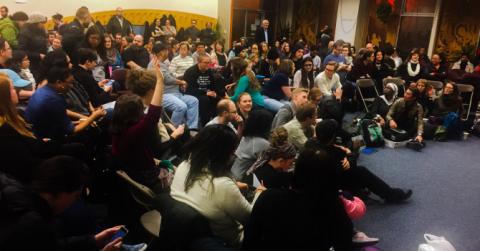In neighborhoods across Chicago with large immigrant populations, people are banding together to form rapid response networks to support their neighbors in the event of expected deportation raids by President Donald Trump’s administration.
In the 35th Ward on the city’s Northwest Side, Ald. Carlos Ramirez-Rosa has started what he calls the Community Defense Committee.
In Little Village, the Mexican capital of the Midwest, they have picked the name La Villita Se Defiende, which translates to Little Village Defends Itself.
As with the different names, each group seems to be charting its own tactical approach, but the overarching goal is the same: to protect undocumented immigrants by resisting efforts to deport them.
Resistance eventually could take the form of actually interfering with federal agents in the performance of their duties, something not to be taken lightly but a measure of what’s at stake.
“Fundamentally, the message is ‘Get the out of this neighborhood,” said Gabe Gonzalez, one of the lead organizers in Rogers Park.
OPINION
I was among more than 400 people who attended a Protect RP organizational meeting Monday night, an extraordinary display of how hungry people are to Do Something.
The meeting was held at Living Water Community Church, where pastor Kristin Jackson said two-thirds of the congregants are immigrants, some of them undocumented.
But my impression is most participants that night were American citizens acting in support of their neighbors, not out of self-preservation. And they weren’t just the liberal fringe.
Trump won the election with his promise of mass deportations, but many still believe the better answer is to change the immigration laws to protect most of those who are living here and to map out a more coherent system going forward.
Call that a path to citizenship or call it amnesty, but that’s still the goal to me, even if we’re now playing defense instead of offense.
“People are very receptive and very eager to support this effort,” said Rosa, who is using techniques learned by immigrant groups in Arizona and Georgia in response to deportation raids conducted by the Obama administration.
So far, the 35th Ward Community Defense Committee has concentrated on canvassing door to door to make sure families know their rights if immigration enforcement agents come to their home.
Eventually, they hope to be well enough organized to respond immediately to an immigration raid with peaceful, non-violent acts of civil disobedience that could include physically blocking an Immigration and Customs Enforcement truck, Rosa said.
That would be a serious step, and Rosa said it will require specialized training to make sure participants are aware of their rights — and the potential risks.
The hard truth, expressed plainly at the Rogers Park meeting, is that deportation raids are within the law and that some forms of resistance might not be.
In both Rogers Park and the 35th Ward, which includes a large undocumented population in Hermosa, there is discussion of enlisting churches and schools to serve as short-term sanctuaries in the event of an immigration raid. Churches and schools have no legal safe haven status, but raiding them makes for especially bad public relations.
Part of the challenge for organizers is to better prepare their communities for deportations without adding to the fear and anxiety Trump’s executive orders already have caused. Most Mexican immigrant families have at least one family member living here illegally, so the concern is widespread.
Trump’s executive orders have made an estimated 8 million of the nation’s 11 million undocumented immigrants a priority for deportation.
So far, Chicago has not experienced any stepped-up enforcement activity beyond what occurred under Obama. But everyone is expecting that to change.
Gonzalez said Rogers Park will be ready.
“When this neighborhood is violated, we will respond,” he promised.


Spread the word